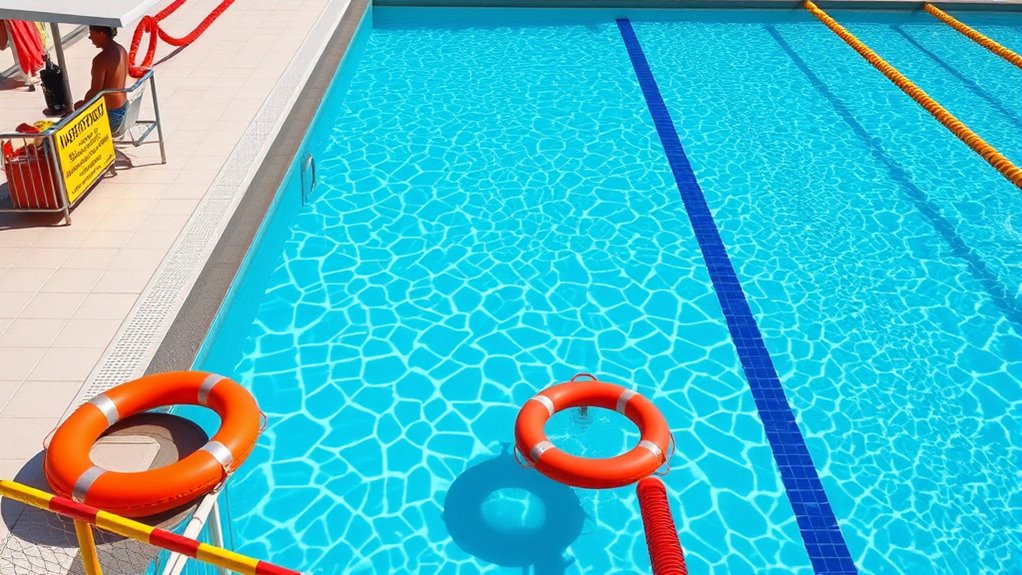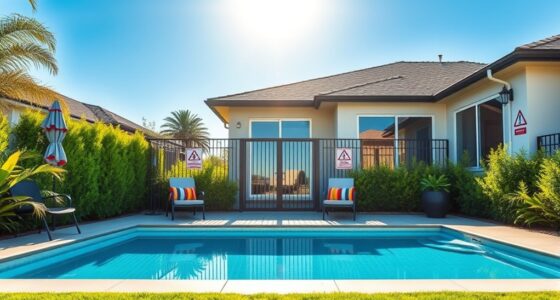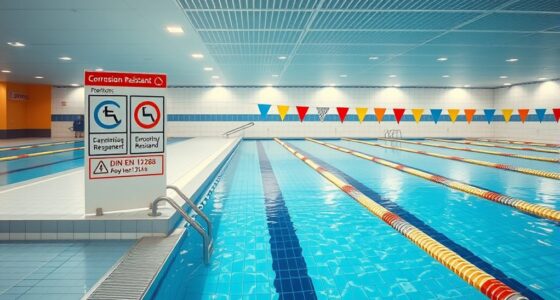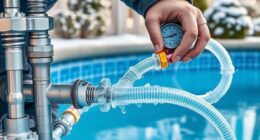In the EU, pool safety rules focus on constant child supervision, reliable alarm systems, and regular upkeep to prevent accidents. You need to supervise children closely and never leave them unattended near water. Installing and maintaining alarm systems, such as door or surface sensors, adds extra protection. Proper fencing and safety checks are also vital. Want to guarantee your pool complies and keeps everyone safe? Discover more about how these regulations work together to protect you and your loved ones.
Key Takeaways
- EU safety standards mandate continuous child supervision and the use of pool alarm systems to prevent accidents.
- Pool alarm systems, including surface and door alarms, are required and must be regularly maintained and tested.
- Fencing around pools is essential to restrict unsupervised access, especially for children.
- Safety protocols require integrating alarms with fencing and pool covers for comprehensive protection.
- Regular safety checks and maintenance of equipment are crucial to ensure compliance and effective accident prevention.

Swimming pools in the European Union are subject to strict safety regulations designed to protect users and prevent accidents. As someone responsible for pool safety, you need to understand that these rules emphasize the importance of child supervision and the use of pool alarm systems. Guaranteeing children are constantly watched over is a fundamental aspect of safety, as young kids can be quick to slip into the water without warning. Regulations often specify that children should never be left unattended near the pool, and you should establish clear supervision protocols. This might include assigning a dedicated adult to oversee children at all times or ensuring that someone is always within arm’s reach when kids are in or around the pool area.
Child supervision and pool alarms are essential for EU pool safety compliance.
In addition, many EU countries require pool alarm systems as a critical safety measure. These systems are designed to alert you immediately if someone enters the pool area unexpectedly or if there’s any accidental fall into the water. Pool alarm systems come in various forms, such as surface sensors that detect movement on the water’s surface, or door alarms that sound when access points are opened. Installing these alarms acts as an extra layer of security, especially when children are involved, giving you peace of mind that you’ll be notified immediately of any unexpected activity. They’re particularly useful during times when constant supervision might be challenging, such as when adults are busy with other tasks or guests are present.
Regulations also specify that alarm systems must be properly maintained and regularly tested to confirm they function correctly. This means checking batteries, sensors, and alarms periodically to prevent false alarms or failures during an emergency. You’re encouraged to integrate pool alarms with other safety measures, like fencing and cover systems, creating a detailed safety environment that minimizes risks. Fencing should be secure enough to prevent children from gaining unsupervised access, but alarms provide an additional safety net in case a gate is left open or a fence is compromised. Moreover, understanding the common causes of failure of safety equipment can help you better maintain your safety systems and ensure they operate effectively when needed.
Ultimately, the goal of these regulations is to create a safe environment where accidents are less likely to happen. By prioritizing child supervision and installing reliable pool alarm systems, you not only comply with EU safety standards but also protect your loved ones and guests. It’s your responsibility to stay vigilant, perform regular safety checks, and foster a culture of safety around your pool area. These measures, though sometimes overlooked, are critical in preventing tragedies and ensuring everyone can enjoy the pool safely.
Frequently Asked Questions
How Are Compliance Violations Enforced Across EU Member States?
You’ll find that enforcement mechanisms in the EU guarantee compliance violations are addressed through national authorities, which can impose fines or sanctions. Cross-border compliance is managed via cooperation among member states and EU agencies, allowing for coordinated action when violations occur across borders. You’re encouraged to report violations, and authorities work together to enforce rules consistently, maintaining high safety standards throughout the EU.
Are There Specific Safety Standards for Inflatable or Temporary Pools?
Think of inflatable and temporary pools as delicate bubbles that demand careful handling. You’re required to follow inflatable pool regulations and temporary pool safety standards that guarantee stability and prevent accidents. These standards specify the materials, structures, and safety features needed. By adhering to these rules, you help keep the waters safe, preventing the bubble from bursting and ensuring everyone enjoys a fun, secure splash without worries.
How Do Regulations Differ Between Residential and Public Pools?
You’ll find that regulations for residential pools focus heavily on child supervision and pool fencing to prevent accidents. Public pools, however, have stricter rules, including regular safety inspections, lifeguard presence, and designated safety equipment. Both types require secure barriers, but public pools often enforce more extensive standards. As a pool owner, make certain you maintain proper fencing and constant child supervision, especially for residential pools, to meet safety regulations and protect everyone.
What Are the Penalties for Non-Compliance With EU Pool Safety Laws?
If you don’t comply with EU pool safety laws, you face penalties like hefty fines, suspension of operations, or even legal action. You’re also required to have liability insurance to cover potential accidents and display clear signage requirements to warn swimmers. Non-compliance can lead to increased liability, damage to your reputation, and potential closure, so ensuring adherence is vital to avoid these penalties and protect your pool environment.
How Often Are Pool Safety Regulations Reviewed or Updated?
You should know that regulatory review and legislative updates for pool safety regulations in the EU typically occur every few years. Authorities regularly assess current standards to guarantee safety and incorporate new technologies or safety concerns. These updates are driven by ongoing research, incident reports, and safety advancements. Staying informed about these reviews helps you remain compliant and ensures your pool meets the latest safety standards, reducing risks for everyone involved.
Conclusion
By understanding the pool safety regulations across the European Union, you can guarantee your pool remains a safe haven rather than a hazard. These rules are like a sturdy shield, protecting swimmers from potential accidents. Staying informed and compliant helps you create a secure environment for everyone. Remember, safety measures are the backbone of enjoyable swimming experiences—think of them as the silent guardians keeping fun afloat and risks at bay.









